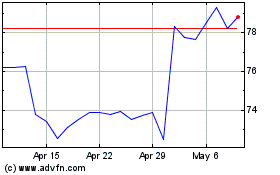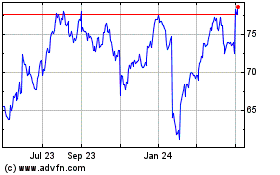By Christopher Alessi in Frankfurt and Ian Walker in London
Dutch paints and chemicals maker Akzo Nobel NV said Thursday it
has rejected an unsolicited EUR20.9 billion ($22.1 billion) offer
from U.S. peer PPG Industries Inc., in the latest sign that no
company is immune from being targeted in the rapid wave of
consolidation engulfing the global chemicals industry.
Amsterdam-based Akzo said PPG made an offer of EUR54 in cash and
0.3 PPG shares for each Akzo share, corresponding to a value of
EUR83 a share.
Akzo, which counts Dulux, Sikkens, Interpon and Eka among its
brands, said PPG's proposal substantially undervalues the company
and isn't in the interest of its shareholders. The company, which
employs 46,000 people in around 80 countries, said its board has
carefully reviewed and considered PPG's proposal and unanimously
rejected it.
"The proposal contains serious risks and uncertainties," Chief
Executive Ton Büchner said in a statement. "I firmly believe that
Akzo Nobel is best placed to unlock the value within our company
ourselves," he added.
PPG confirmed the proposal, saying it continues to believe there
is strong strategic rationale for the deal and that it would now
consider its next steps. It added that a combination would create a
strong competitor in a highly competitive market by bringing
together complementary products and technologies, as well as
strengths in different parts of the world.
Mr. Büchner said PPG's approach had prompted Akzo to announce
plans to explore separating its specialty chemicals business,
including establishing the unit as an independent listed entity.
The business, which reported revenues of EUR4.8 billion in 2016,
produces a range of chemicals used in construction, industrial and
consumer goods.
The spurned offer sets up a standoff between two of the world's
oldest industrial companies. Akzo Nobel was created in 1994 from
the merger of paint and chemicals companies in Sweden and the
Netherlands that dated back more than a century, including a
chemicals firm founded by Alfred Nobel, who launched the prizes
that bear his name. Akzo later acquired two of Britain's oldest
paint and chemicals firms.
PPG, founded in 1883 as Pittsburgh Plate Glass Co., was the
first U.S. company to successfully market large sheets of glass,
until then an expensive rarity. It quickly expanded into chemicals
to secure a supply of raw materials and was an early supplier of
the automotive and aviation industries.
Mr. Büchner, who took over the top job at Akzo in 2011, has
presided over a comprehensive restructuring and led the company
back to profitability. But he has in the past resisted separating
the specialty chemicals unit because it has been the group's "cash
cow," said Markus Mayer, an analyst with Germany's Baader Bank.
"The market would love that Akzo would spin off specialty
chemicals," Mr. Mayer added.
Such a move would be in line with PPG's interests were it to
come back with a revised bid, analysts said. If Akzo was already in
the process of separating its specialty chemicals business, the
ultimate sale of the unit could help PPG in refinancing its
acquisition of Akzo.
Analysts and investors seemed to support the idea of a PPG
takeover of the Dutch company. Akzo's share price was up 12% in
morning trading at EUR72.32.
A tie-up would be "credible and potentially powerful," analysts
at Bernstein Bank noted. Analysts at Citigroup said the "strategic
rationale" for a deal was high, though noted overlap of some
business areas could raise antitrust concerns in Europe.
The offer comes amid a period of consolidation in the chemicals
industry. U.S. giants Dow Chemical Co. and DuPont Co. are in the
process of completing a $120 billion merger, and have offered to
sell businesses to gain approval from the European Union's
antitrust regulator.
Industrial gas giant Praxair Inc. and Germany's Linde AG created
a combined entity worth $66.6 billion after it agreed to a merger
in December.
Other potential tie-ups in the broader chemicals sector include
Bayer's planned $57 billion takeover of U.S. agrochemical giant
Monsanto Co. and China National Chemical Corp.'s planned $43
billion acquisition of Swiss seed company Syngenta AG.
After a record year of mergers and acquisitions activity in the
industry, consolidation is likely to continue in chemical
industries across the board, Baader's Mr. Mayer said. He cited a
low growth environment, cheap financing and overcapacity in many
markets.
Thursday's proposal isn't the first time PPG has courted Akzo.
In 2012, the Pittsburgh-based company bought Akzo's North American
house-paint business for $1.05 billion.
In December PPG launched a restructuring program in an effort to
save $120 million to $130 million a year because of a slowdown in
global demand and weaker-than-expected growth in Europe.
Akzo became one of the world's largest paints makers after it
acquired U.K. rival Imperial Chemical Industries Ltd. in 2008 for
GBP8 billion ($12.9 billion). But the Dutch company struggled to
digest the debt-financed acquisition, which raised its exposure to
Europe's troubled automotive and construction industries,
culminating in a series of profit warnings in 2011. It has since
slashed costs and laid off staff.
At close of business Wednesday, Akzo had a market capitalization
of $17.12 billion, while PPG's was $27.47 billion.
Write to Christopher Alessi at christopher.alessi@wsj.com and
Ian Walker at ian.walker@wsj.com
(END) Dow Jones Newswires
March 09, 2017 06:51 ET (11:51 GMT)
Copyright (c) 2017 Dow Jones & Company, Inc.
DuPont de Nemours (NYSE:DD)
Historical Stock Chart
From Mar 2024 to Apr 2024

DuPont de Nemours (NYSE:DD)
Historical Stock Chart
From Apr 2023 to Apr 2024
